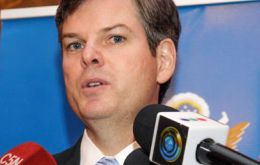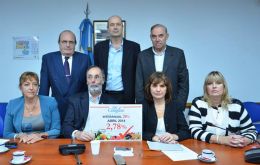MercoPress. South Atlantic News Agency
Tag: Axel Kicillof
-
Friday, June 13th 2014 - 08:26 UTC
US Supreme Court decision of Argentina/hedge funds case delayed until Monday

The US Supreme Court will reveal its decision on Argentina's request regarding litigation with the hedge funds case on Monday at 10.30am, after deliberating on Friday behind closed doors. A final outcome could arrive as late as next year though, if the judges decide to ask the US government for an opinion on the case before ruling.
-
Monday, June 9th 2014 - 06:10 UTC
US Embassy praises Argentina: says 'investment climate has started to change'

The United States Chargé d'Affaires at the Embassy In Buenos Aires Kevin Sullivan, who is in charge of the embassy on an interim basis, praised Argentina’s agreement with Paris Club, ICSID and YPF-Repsol deal, saying “the situation is changing, in a good way” and pointing out a change in investment climate.
-
Monday, June 2nd 2014 - 07:33 UTC
Argentina confident US Supreme Court will take its litigation case with hedge funds

President Cristina Fernandez administration has high hopes that the US Supreme Court will take its long running litigation case with holdout hedge funds that refused to accept sovereign debt rescheduling after Argentine defaulted in 2001.
-
Saturday, May 31st 2014 - 07:55 UTC
The 'morality' of the Argentina/Paris Club deal is that it's 'a shared effort'

Argentina's Economy minister Axel Kicillof gave details on Friday of the payment agreement reached with the Paris Club involving 9.7bn dollars of 2001 defaulted debt, which will open the doors to export credit agencies from the group's members and equally important signals a new attitude from the Cristina Fernandez administration.
-
Friday, May 30th 2014 - 05:11 UTC
France praises Argentina's agreement with Paris Club and normalization efforts

French Finance Minister Michel Sapin praised Argentina’s agreement with Paris Club creditors, saying it highlights the country’s effort to “normalize its relations with creditors.”
-
Thursday, May 29th 2014 - 05:37 UTC
Argentina announces an understanding with the Paris Club on defaulted debt

Following twelve hours of discussions the Argentine delegation headed by Economy Minister Axel Kicillof managed on Wednesday to agree the main points for Argentina to overcome the approximately 9.5bn dollars default with countries that make up the Paris Club, according to late reports from the French capital.
-
Tuesday, May 27th 2014 - 08:34 UTC
Argentina in another negotiating round with the Paris Club of creditors

Argentina's Economy Minister Axel Kicillof has assured that progress has been made with creditors in the Paris Club as the politician left Monday evening for France in preparation for talks with the financial institution over restructuring Argentina's debt, estimated in 9.5bn dollars.
-
Saturday, May 24th 2014 - 00:27 UTC
Argentina's auto sales record last year was fed on 'steroids', claims Fiat CEO

One of Argentina's main industry leaders, Fiat CEO Cristiano Rattazzi. said that the boost of auto manufacturing during 2013 and record sales was fed on 'steroids' and demanded more reliability in the rules to revitalize sales.
-
Friday, May 16th 2014 - 10:06 UTC
Argentina's April inflation for the Congressional index reached 2.8%

Argentina's inflation congressional index marked 2.8% in April, or 15.78% in the first four months of the year and 39% in the last twelve. These percentages contrast with the official data from the Indec stats office which earlier this week said the April CPI was 1.8%.
-
Thursday, May 15th 2014 - 07:14 UTC
Consumer prices in Argentina decelerate, but controversy on how much persists

The Argentine consumer-price index climbed 1.8% in April over March, which means that during the first four months of the year it reached 11.99%. The CPI announcement was made by Economy minister Axel Kicillof at a press conference on Wednesday. However private estimates and the Buenos Aires City index show greater percentages.
